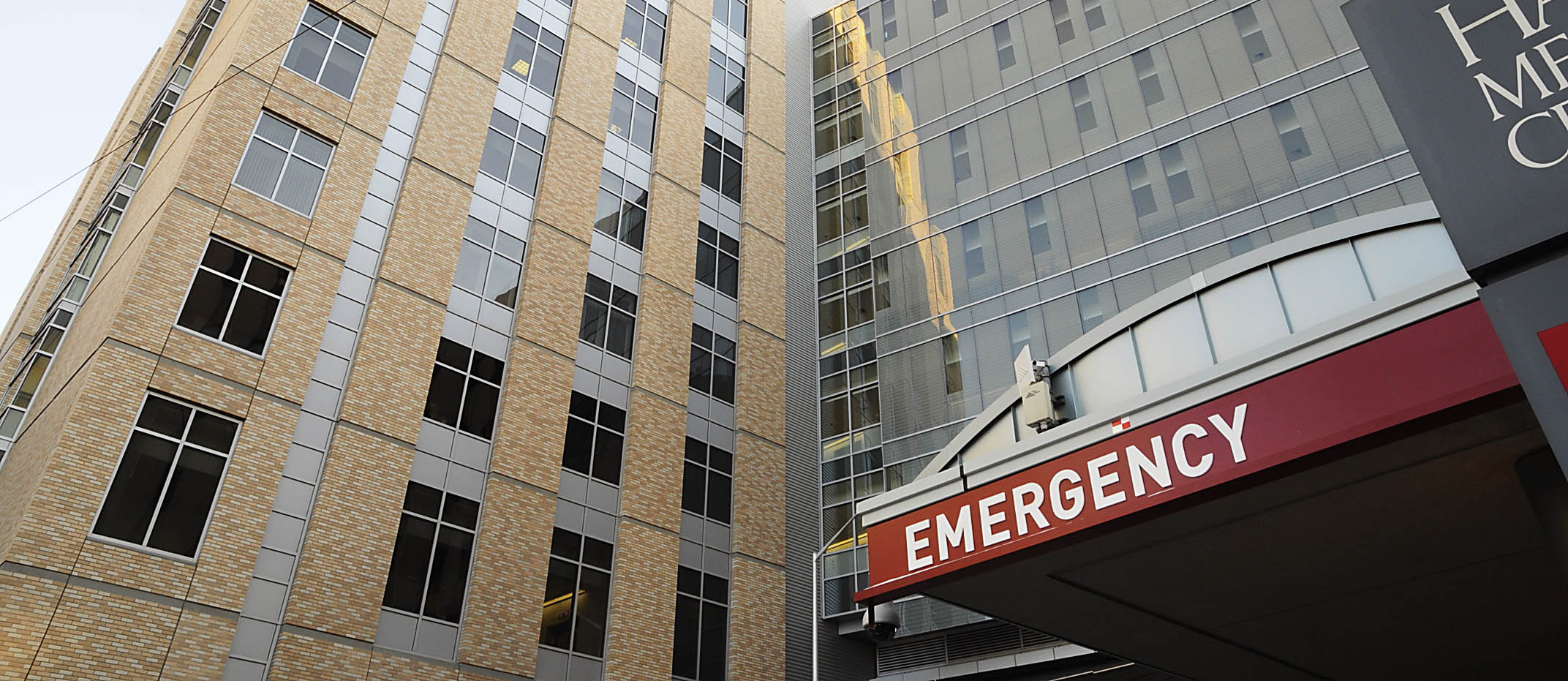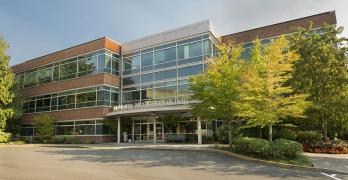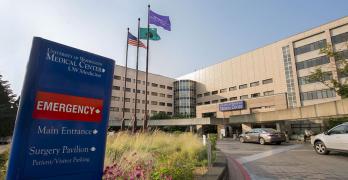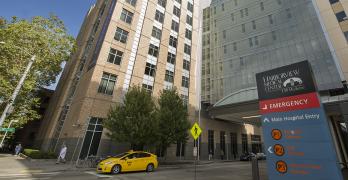Kidney Care
Specialized nephrological care across the spectrum of kidney conditions

Innovative integrated care for acute and chronic kidney diseases and conditions.
Evidence-Based Care
We offer specialized clinics for a variety of kidney disorders, with care informed by the most up-to-date clinical and scientific research.
Expertise You Can Trust
UW Medical Center’s nephrology specialists provide the highest standard of kidney care and transplant outcomes that far exceed the national average.
Leading Through Innovation
Our patients receive the latest treatments for common and complex kidney conditions and can benefit from novel therapies through clinical studies.

Meet the provider: Matthew Rivara, M.D.
Dr. Rivara is a board-certified nephrologist, assistant professor and investigator at the UW Kidney Research Institute. He works tirelessly to personalize care for each of his patients. View full bio.
Some of our common services:
Many autoimmune diseases can affect the kidneys. Common examples include lupus and vasculitis which can result in kidney damage and sometimes kidney failure if left untreated. Our nephrologists can effectively treat these autoimmune diseases using targeted medications.
This condition is characterized by a gradual loss of kidney function over time, often as the result of other disorders that can damage the kidneys. If chronic kidney disease progresses, it can lead to kidney failure needing dialysis or kidney transplantation. Our specialists can expertly diagnose this condition, help to manage its symptoms and slow its progression.
This kidney disease is due to diabetes, both type 1 and type 2, and is the most common cause of kidney failure in the U.S. Our providers are highly trained at diagnosing this condition and developing an individualized treatment plan to help slow its progression and keep you healthy.
At UW Medicine, our extensive kidney research programs help to identify new and optimal ways to treat and prevent kidney diseases. As a UW Medicine patient, you have the opportunity to receive novel therapies by participating in clinical trials.
Kidney failure, also called end-stage renal disease, occurs due to kidney damage. Chronic kidney failure progresses slowly and may result in kidney failure over months to years. It can be treated with dialysis, which removes waste substances from the blood that are normally removed by the kidneys. Treatment may take place in a center or at home.
Certain inherited diseases can affect the kidneys along with other organs and body systems, and several rare genetic diseases primarily affect the kidneys. The UW Medicine Kidney Genetics Clinic specializes in caring for patients who have a known or suspected genetic kidney disease, providing advanced diagnosis and treatment, as well as access to clinical trials when possible.
This is a form of inherited glomerular disease that affects both men and women but men are more likely to have kidney problems. Symptoms typically begin in childhood. Treatment focuses on preventing and treating high blood pressure and preventing kidney damage.
This inherited disorder results from the buildup of a particular type of fat in the body's cells. Beginning in childhood, this buildup affects many parts of the body, including the kidneys, and can cause progressive kidney damage. We offer a variety of advanced treatments for this condition, including recombinant enzyme replacement.
At the Kidney Genetics Clinic, our nephrologists work closely with medical geneticists to diagnose genetic kidney diseases using the latest genetic testing, including whole exome sequencing. Our genetic counselors help you understand the testing process and the implications of the results.
This is a genetic disorder characterized by the growth of numerous cysts filled with fluid in the kidneys. The cysts can reduce kidney function and lead to kidney failure. While there's no cure for this condition, our specialists offer a variety of advanced treatments that can improve symptoms, delay disease progression and slow further kidney damage.
Glomerular disease occurs when the kidneys' filters (glomeruli) are damaged and scarred, causing the kidneys to slowly lose their ability to work properly. This condition can result from toxins, medicines, infections or autoimmune diseases like lupus. Our nephrologists at the Glomerular Disease Clinic at UW Medical Center work closely with our renal pathologists to diagnose and treat this condition using the most up-to-date approaches available.
Hypertension, or high blood pressure, is one of the leading causes of kidney disease. Long periods of poorly controlled hypertension can lead to kidney failure or worsen existing kidney disease. Our nephrologists can expertly diagnose this condition, manage symptoms and slow its progression using the latest treatment methods.
Hypertension is a chronic medical condition in which high blood pressure can lead to increased long-term risk for heart disease, kidney disease and stroke. At the UW Medicine Hypertension Clinic, we offer a comprehensive and team-based approach to diagnosing and managing severe or difficult-to-control high blood pressure, including evaluating for inherited and reversible forms of hypertension. We work closely with interventional radiologists and cardiologists to pursue advanced diagnostic procedures when necessary. Our care team also includes clinical pharmacists who carefully monitor response to treatment to help implement an individually tailored hypertension management plan.
If you have heart disease, your chance of developing kidney disease is much greater. At the Kidney Cardiac Clinic, we offer comprehensive testing and screening for kidney disease, and education on how to keep your kidneys as healthy as possible.
Patients who have liver disease or cirrhosis often develop complications affecting their kidneys. Our specialists in the kidney-liver program offer the most advanced treatments available for this condition, including specialized transfusions and medications as well as kidney transplant.
Kidney palliative care, also known as renal supportive care, is specialized kidney care to help people with advanced kidney disease live as well as possible for as long as possible. Our expert clinicians address physical symptoms, and guide people with advanced kidney disease to tailor treatment decisions to what is most important to them. Our experts also lead an initiative at Northwest Kidney Centers to meet the palliative care needs of people on kidney dialysis.
A kidney stone is a hard, pebble-like deposit that forms in the kidney, sometimes getting stuck in a ureter, the bladder or the urethra. Kidney stones often cause extreme, sharp pain. Our nephrologists at the Kidney Stone Center at UW Medical Center - Northwest are experts at diagnosing this condition, treating painful symptoms, removing the stone when possible and helping to prevent recurrence.
Kidney vascular disease refers to a number of vascular conditions that block or reduce blood flow into and out of the kidneys, sometimes causing kidney damage, kidney failure and high blood pressure. Our nephrologists can accurately diagnose kidney vascular disease using advanced imaging techniques and develop an individualized treatment plan.
When a kidney fails, treatment is needed to replace the diseased kidney with one that works. There are two types of treatment for kidney failure — dialysis or transplantation. Many people prefer kidney transplantation as a long-term treatment because it offers more freedom and a better quality of life than dialysis. People with type 1 diabetes may qualify for a pancreas transplant along with a kidney transplant.
Kidney transplants are a key aspect of our expertise. We offer specialized, state-of-the-art care for patients requesting or requiring transplants, including comprehensive eligibility screening and access to new medications for preventing rejection of transplanted kidneys through clinical studies.
If you or a loved one has end-stage renal disease, the UW Medicine Kidney Care and Transplant Program offers state-of-the-art, compassionate care with a special emphasis on living donor kidney transplantation. We offer expert care to our donors, including careful and respectful evaluation to ensure that it is safe for them to donate.
Our Onco-Nephrology Clinic focuses on kidney disorders that can arise in patients with cancer as a side effect of treatment or related to cancer directly. We work closely with our colleagues at Fred Hutchinson Cancer Care to provide a patient-centered approach to care for conditions such as chemotherapy and immunotherapy-related toxicities and electrolyte imbalances. We also evaluate kidney function before and after stem cell transplant.
Patients with type 1 diabetes — an autoimmune disease in which the pancreas stops producing the hormone insulin — may qualify for a pancreas transplant as well as a kidney transplant, if it's determined that it's needed. A successful pancreas transplant can allow the patient to control blood sugar without needing to use insulin because the new pancreas will create it for them. Patients no longer have problems with very low blood sugars (hypoglycemia), or diabetic ketoacidosis (DKA) or coma from very high sugars (hyperglycemia), all of which can be life-threatening. Normal blood sugars can prevent or sometimes reverse long-term complications of diabetes.
Inform yourself to make the best choices for your health and care with UW Medicine patient education resources.
Our skilled nephrologists can accurately diagnose a wide range of kidney diseases using comprehensive tests that include a specialized physical exam, blood and urine panels, advanced imaging, and biopsies. After diagnosis, we work closely with you to educate you on your condition and develop an individualized treatment plan.
Convenient care, in your neighborhood.
Kidney Clinic at Harborview
Medical Specialties
Hours Today
Kidney Stone Center at UW Medical Center - Northwest
Medical Specialties
Hours Today
Glomerular Disease Kidney Clinic at UW Medical Center - Montlake
Medical Specialty
Appointments
Kidney Care & Transplantation Services at UW Medical Center - Montlake
Medical Specialties
Hours Today
Appointments
Kidney Genetics Clinic at Harborview
Medical Specialties
Hours Today
Appointments

Should I go to the emergency room or urgent care?
If you have an illness or injury that you think may be life-threatening without immediate care, call 911 or go to the nearest emergency room.
If you have an illness or injury that is not life-threatening but needs attention today, go to urgent care.




